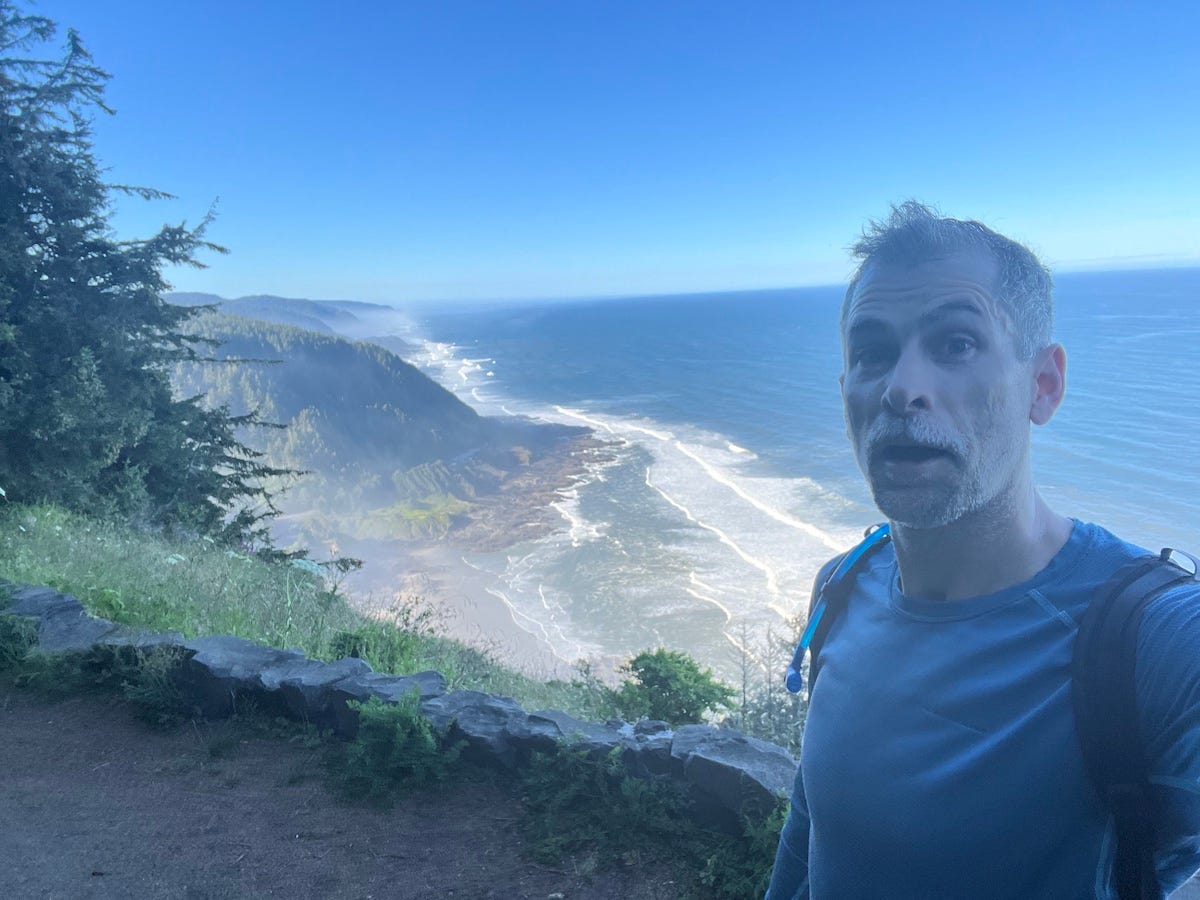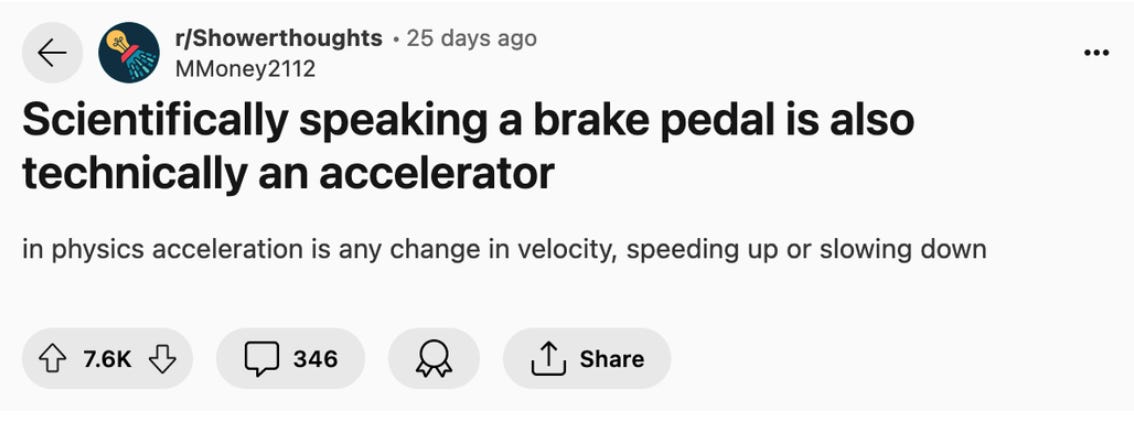The Key to Creating a Remarkable Business is Taking it Slow
Lessons from Cal Newport's Slow Productivity for the entrepreneur
Amazing views from Cape Perpetua on the Oregon Coast
Hello there,
Summer is in full swing out here in Portland, and combined with outdoor recreation, house projects keep drawing me away from writing…
A few weeks back, I traveled to Boise for a convention about online creators who sell stuff, run by ConvertKit. I went looking for motivation to make higher quality videos online, and sure enough, I got it!
I even met the YouTuber and productivity expert Ali Abdaal, whom I have enthusiastically quoted many times here. It turns out he’s just a regular guy, and he enjoyed my story of launching a product on Kickstarter.
His most interesting advice was to ask yourself, “What would you do if you were optimizing for enjoyment?”
Is it Better to be a Slow Entrepreneur?
What do the most impressive authors and creative people have in common? Over time, they are prolific, but in the short term, they seem to move at a snail’s pace. There’s a direct connection between creating lasting art or writing and building a valuable business.
Take Lin Manuel Miranda and his terrific first play, In The Heights, which won multiple Tony Awards in 2008. A perfect example of overnight success, right? Not quite. The lesser-known history involves seven years of workshopping to get the production from a rough musical performed in Lin’s junior year of college to the final Broadway version.
If the goal is to create and share things with lasting impact, you must avoid busying your days with small tasks that don’t move the ball forward. Cal Newport, in his book Slow Productivity, writes to “obsess over the quality of what you produce, even if this means missing opportunities in the short term.”
Tim Ferriss echoes this idea: “My whole goal is to slow down and look around. Instead of looking for all the tasks I could do, I try to identify the one Big Domino—the One Thing that, if I could knock THAT down, all the other dominos would either fall down or become irrelevant.”
Creating a successful business also requires taking time to prioritize what’s most important. Here are three critical elements of Slow Entrepreneurship I’m working to follow:
1) Choose Your Mission(s) Carefully
When starting a new venture, there are a million things to do. Y Combinator’s motto is simple: “Make something people want.” Reid Hoffman, founder of LinkedIn, says you should be slightly embarrassed by your first product. This is true, but with the caveat that you need a plan to iterate and improve quickly.
Unless you’re Steve Jobs, the best way to make a better product is to get feedback from customers. The founder of Rx Bars illustrates this: after finding his idea to make energy bars for CrossFit athletes, he approached his dad for investor contacts. His dad responded, “You need to shut the f** up and go sell a thousand bars.”
Not every business needs to start focused on sales. Maybe the goal is to delight customers or nail down valuable intellectual property. Defining your short list of missions ensures your calendar reflects time invested in solving your most important problems.
2) Carve Out Thinking Time
One of my favorite business activities is the calendar audit. Instead of listing your priorities, let someone else review your calendar to see what you spend the most time doing.
To make smart strategic decisions, you need thinking time. That time may not look incredibly productive on paper but will pay off a hundred times over. Morgan Housel writes in Same As Ever: “A successful person purposely leaving gaps of free time on their schedule to do nothing in particular can feel inefficient… if your job is to be creative and think through tough problems, then time spent wandering around a park or aimlessly lounging on a couch might be your most valuable hours.”
Cal Newport’s Slow Productivity offers actionable tips on protecting your thinking time:
Each week, figure out the steps needed to make progress on your mission. Calculate the necessary time and schedule it.
Whenever a meeting is scheduled, book another equal time slot for “individual work” to ensure no more than 50% of your time is filled with meetings.
Schedule weekly “office hours” for impromptu calls or messages.
3) Prioritize Energizing Activities
Productivity isn’t about having enough time; it’s about having enough energy. To get important things done, you need to keep fuel in the gas tank. In aiming for efficiency, we might cut out activities like writing thank you notes or doodling, but those can refill your attention span and reinvigorate your willpower. Pay attention to what energizes you and put it on your calendar.
One “slow habit” I cultivate is rewriting quotes or ideas by hand into a pocket notebook. Revisiting these ideas clarifies my thinking and helps draw connections.
When you prioritize success on a longer time horizon, it removes the pressure to play email ping-pong. Instead, look for those big dominos.
By the way, when did Lin Manuel Miranda get the idea for Hamilton? Not during a Zoom call! He was on vacation, reading on the beach when he became enthralled with Ron Chernow’s biography, leading to the now-famous play.
“Grand achievement is built on the steady accumulation of modest results over time.” — Cal Newport, Slow Productivity
Worthy & Remarkable
MOFT is a phone case plus little writing pad and pen - perfect to take on a short stroll for some thinking time! (Raised $82k on Kickstarter)
There’s even room for a simple jelly knife on Kickstarter - terrific!
This young climber from NYC sends an terrifying crack in Index, WA - he’s ascending all the 5.14’s he can while only clipping the gear he places himself (no bolts or fixed gear!)
A beautiful feature in the Mt Blue Sky area of Colorado (prev. called Mount Evans) gives me a new respect for “alpine sport climbing”
One Thing from Me
The thing I hear over and over from top leaders is the importance of learning. It’s so easy to get caught up in all the small tasks and forget to make time to learn something new.
For me, what works best is to chase my curiosity, which makes learning far more satisfying than hitting an arbitrary metric goal (e.g., hours of a course completed or new technical terms memorized).
What can you do to cultivate a little more curiosity this week? How can you choose SEARCH over the FEED?
Strengthen your thinking muscles by seeking answers to questions that genuinely interest you (not just something an algorithm has served you).
Then, take some time to stew on what you learned and maybe share it with a friend.
I’ve had it on my to-do list for multiple years to start a mastermind group where I talk to peers every other week and share lessons. But scheduling stuff is hard!
So my baby step in the right direction is writing one email a week, sharing a few business insights with other people working on new ventures.
“Start small, start now. This is much better than, ‘start big, start later.’ One advantage is that you don’t have to start perfect. You can merely start.” — Seth Godin
Unhurriedly,
Jono
PS - favorite little joke I’ve seen all week:



